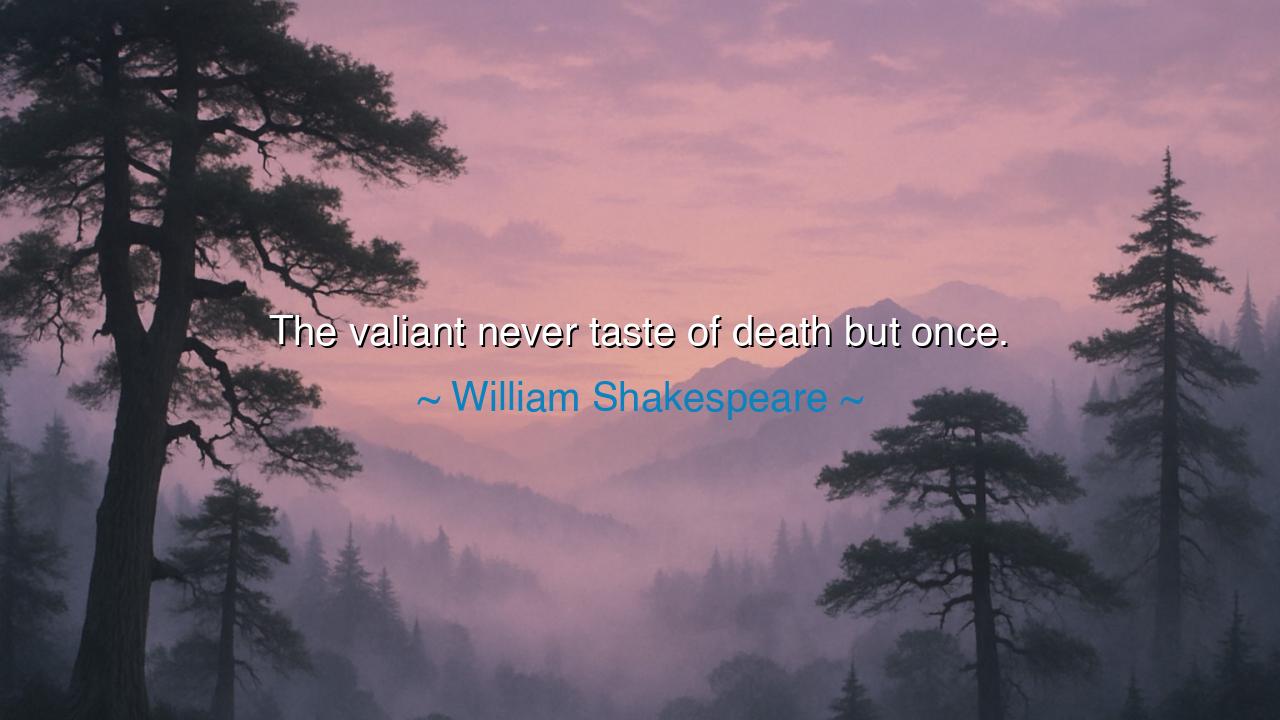
The valiant never taste of death but once.






When William Shakespeare wrote, “The valiant never taste of death but once,” he spoke not merely of battle or the spilling of blood, but of the eternal difference between courage and fear. These words, found in Julius Caesar, are spoken by Caesar himself as he contemplates the nature of mortality. To the coward, life is filled with a thousand small deaths — moments of retreat, hesitation, and surrender to fear. But to the brave, death comes but once, when the body’s course is finished and the spirit is freed. The valiant, in living fully and without fear, die but a single time; the coward dies each day he allows fear to steal the life still within him.
The origin of this quote lies in one of Shakespeare’s most profound meditations on fate and courage. In the play, Caesar senses that his end draws near, yet he refuses to tremble before it. “Cowards die many times before their deaths,” he says, “the valiant never taste of death but once.” Here, Shakespeare reminds us that death is not only an event of the body, but a state of the soul. Every time we shrink from truth, from love, from duty — every time we allow fear to rule us — we experience a kind of death: a dimming of the spirit, a loss of freedom. But the one who stands firm, who acts with honor and purpose, lives wholly until the very end, and thus dies only once.
In this truth there is deep wisdom for all ages. For what most men fear is not death itself, but the anticipation of it — the shadow it casts across the moments of life. The coward dies again and again in imagination, tormented by visions of loss and pain. But the valiant man looks upon the inevitable and says, “Let it come when it may; until then, I shall live.” Such a soul walks unburdened. He knows that fear, not death, is the great thief — and he refuses to let it rob him of even a single day. To live without fear is to live eternally, for each moment is tasted in its fullness, untainted by dread of its ending.
Consider the life of Joan of Arc, the humble maiden who led armies by divine conviction. When faced with execution, she did not plead or tremble. She said only that though her body would burn, her soul would rise to God. In that moment, she embodied the meaning of Shakespeare’s line. She did not die a thousand deaths in fear of what was to come — she faced it once, and with peace. Her enemies lived on, but haunted by guilt and regret — their cowardice a slow and endless death. Thus it is the brave, not the mighty, who are immortal; for courage sanctifies even the shortest life, while fear corrupts even the longest one.
The valiant, then, are those who accept life’s uncertainty with serenity. They understand that to cling to safety is to begin dying before one’s time. Every act of boldness — every honest word spoken, every risk taken for justice or love — is a refusal to die before death. The hero does not live longer than the coward; he simply lives deeper. He feels the warmth of the sun without flinching from the shadow that follows it. In his heart burns the eternal flame that no grave can extinguish: the flame of a soul that dared to live.
There is also in this wisdom a gentleness, for Shakespeare does not condemn the fearful — he merely awakens them. He reminds us that we are all mortal, yet we need not be slaves to mortality. Death will come, as it must, but we need not invite it early through fear, apathy, or regret. Each time we yield to cowardice — whether through silence in the face of injustice, or hesitation in the pursuit of love — we suffer a spiritual wound. To heal it, we must act boldly, speak truth, and face life’s uncertainties with open hearts. For the valiant know that death has no dominion over those who live in truth.
So take this as your lesson, child of courage: do not die a thousand timid deaths before the one appointed to you. Stand firm before fear, and it will bow before you. Speak when silence tempts you, love when loss threatens you, and act when doubt would paralyze you. For to live bravely is to conquer death long before it comes. Let your heart be valiant, and you shall find — as Caesar knew, and as every soul of strength has learned — that the valiant never taste of death but once, for their spirit, fearless and undying, lives forever in the memory of the world and in the peace of eternity.






AAdministratorAdministrator
Welcome, honored guests. Please leave a comment, we will respond soon